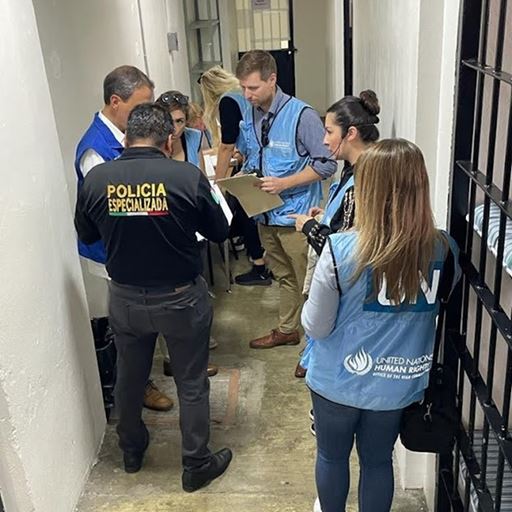Essex academic leads UN visit to Mexican detention centres
-
Date
Thu 5 Oct 23

Arbitrary detention, ill treatment, torture, and even executions are still occurring in Mexico, according to the UN Working Group on Arbitrary Detention.
Working group Vice-Chair and Essex Law School academic Dr Matthew Gillett led a team of experts on a recent trip to Mexico where they visited police stations, migration detention centres, adolescent centres, child protection shelters, mental health hospitals and prosecutors’ offices.
Despite seeing some signs of significant progress, the team insist arbitrary detention is still too widespread throughout the country and have made a number of recommendations to the Mexican Government on how to combat the problem.
Dr Gillett said: "Talking to detainees in prisons, immigration stations, and adolescent centres is critical for human rights fact-finding. “During our recent UN mission, these interviews confirmed that Mexico requires further reforms to end arbitrary detention."
The working group, which also included Dr Ganna Yudkivska (Ukraine), and Dr. Miriam Estrada-Castillo (Ecuador), conducted 173 confidential interviews during their 11-day trip, which saw them visit 15 sites across Mexico City, Nuevo León and Chiapas.
The delegation concluded that excessive use of force was still frequent, especially from the moment a person was detained right up until they appeared before a judge.
Further concerns have also been raised about the systems used for recording detentions; insufficient access to effective legal assistance; excessively long periods of pre-trial detention; attacks on judicial independence and due process; and an overly punitive approach to drug policy.
“In many cases, torture and other forms of ill-treatment are inflicted to extract confessions and incriminating statements,” the experts said.
“Detained migrants are particularly vulnerable…Mexico must ensure that the detention of migrants is a last resort, for the shortest possible time, following an individualised assessment, in dignified conditions and with access to legal assistance…"
The working group found arbitrary detention affects a wide range of people in Mexico, with particular risks to vulnerable groups including indigenous peoples, persons with disabilities, LGBTI+ persons, adolescents, older persons, and people living in poverty.
They have provided recommendations to the Government of Mexico on key issues linked to arbitrary detention, including criminal procedure, migration-related detention, conditions of detention, and the situation of vulnerable people.
During the visit, the delegation met with members of the Mexican Executive, including from the Ministry of the Interior and Ministry of Foreign Affairs; the judiciary, including President Norma Lucía Piña Hernández of the Supreme Court; and the legislature, including from the Senate and Congress.
Greater detail on the United Nations Working Group on Arbitrary Detention's visit to Mexico is set out in the preliminary findings, with a full report due to be submitted to the United Nations Human Rights Council in September 2024.
.jpg?mh=500&mw=500&hash=6568B6C9CCF5290A596BEF6678B6AD0E)



